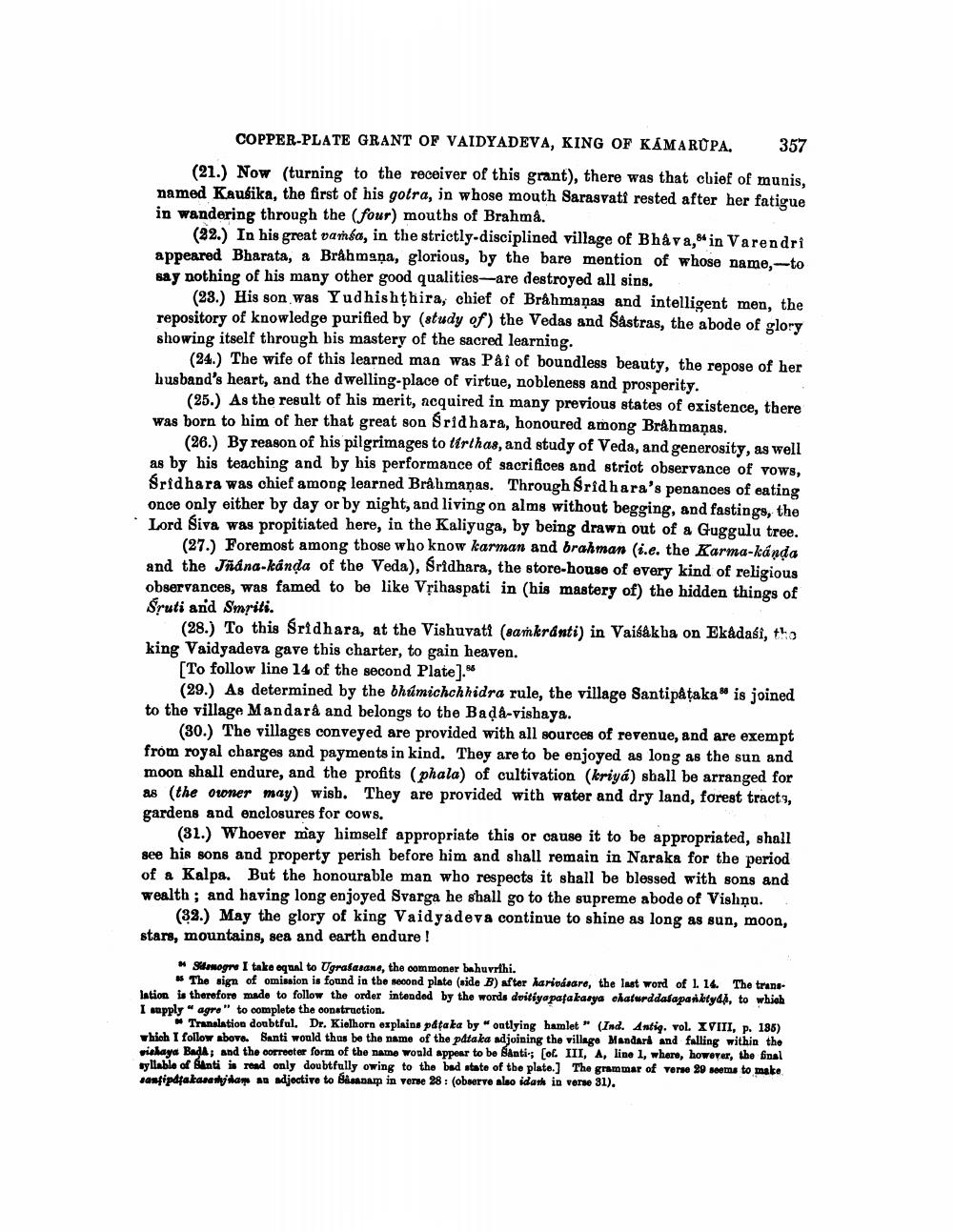________________
COPPER-PLATE GRANT OF VAIDYADEVA, KING OF KAMARUPA.
357
(21.) Now (turning to the receiver of this grant), there was that chief of munis, named Kausika, the first of his gotra, in whose mouth Sarasvati rested after her fatigue in wandering through the (four) mouths of BrahmA.
(22.) In his great vanda, in the strictly-disciplined village of Bhava,"in Varendri appeared Bharata, a Brahmana, glorious, by the bare mention of whose name,-to say nothing of his many other good qualities-are destroyed all sins.
(23.) His son was Yudhishthira, chief of Brahmanas and intelligent men, the repository of knowledge purified by (study of) the Vedas and Sastras, the abode of glory showing itself through his mastery of the sacred learning.
(24.) The wife of this learned man was Pâî of boundless beauty, the repose of her husband's heart, and the dwelling-place of virtue, nobleness and prosperity.
(25.) As the result of his merit, acquired in many previous states of existence, there was born to him of her that great son Sridhara, honoured among Brahmaņas.
(26.) By reason of his pilgrimages to tirthas, and study of Veda, and generosity, as well as by his teaching and by his performance of sacrifices and strict observance of vows, Sridhara was chief among learned Brahmanas. Through Sridhara's penances of eating once only either by day or by night, and living on alms without begging, and fastings, the Lord Siva was propitiated here, in the Kaliyuga, by being drawn out of a Guggulu tree.
(27.) Foremost among those who know karman and brahman (i.e. the Karma-kánḍa and the Jñána-kanda of the Veda), Sridhara, the store-house of every kind of religious observances, was famed to be like Vrihaspati in (his mastery of) the hidden things of Sruti and Smriti.
(28.) To this Sridhara, at the Vishuvati (samkranti) in Vaisakha on Ekadasi, tho king Vaidyadeva gave this charter, to gain heaven.
[To follow line 14 of the second Plate].85
(29.) As determined by the bhúmichchhidra rule, the village Santipâṭaka" is joined to the village Mandarâ and belongs to the Baḍâ-vishaya.
(30.) The villages conveyed are provided with all sources of revenue, and are exempt from royal charges and payments in kind. They are to be enjoyed as long as the sun and moon shall endure, and the profits (phala) of cultivation (kriya) shall be arranged for as (the owner may) wish. They are provided with water and dry land, forest tracts, gardens and enclosures for cows.
(31.) Whoever may himself appropriate this or cause it to be appropriated, shall see his sons and property perish before him and shall remain in Naraka for the period of a Kalpa. But the honourable man who respects it shall be blessed with sons and wealth; and having long enjoyed Svarga he shall go to the supreme abode of Vishnu.
(32.) May the glory of king Vaidyadeva continue to shine as long as sun, moon, stars, mountains, sea and earth endure !
Sanogre I take equal to Ugrafasane, the commoner bahuvrihi.
The sign of omission is found in the second plate (side B) after harivásare, the last word of 1. 14. The translation is therefore made to follow the order intended by the words dvitiyapatakasya chaturddatapanktyd, to which I supply" agre" to complete the construction.
Translation doubtful. Dr. Kielhorn explains pataka by "outlying hamlet" (Ind. Antig. vol. XVIII, p. 135) which I follow above. Santi would thus be the name of the pataka adjoining the village Mandarà and falling within the vishaya Bada; and the correcter form of the name would appear to be Banti; [of. III, A, line 1, where, however, the final syllable of Santi is read only doubtfully owing to the bad state of the plate.] The grammar of verse 29 seems to make santipatakasamjhas an adjective to Basanam in verse 28: (observe also idam in verse 31).




